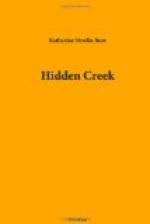“She’s not such a bad old girl, is she?” he admitted when Sheila had been given a half-holiday and was riding on the black horse beside Hilliard on his Dusty across one of the mountain meadows.
“I think she’s a dear,” said Sheila, pink with gratitude; then, shadowing, “If only she wouldn’t beat the dogs and would give up trapping.”
“Why in thunder shouldn’t she trap?”
“I loathe trapping. Do you remember how you felt in the pen? It’s bad enough to shoot down splendid wild things for food, but, to trap them!—small furry things or even big furry things like bears, why, it’s cruel! It’s hideously cruel! When a woman does it—”
“Come, now, don’t call her a woman!”
“Yes, she is. Think of the aprons! And she is so tidy.”
“That’s not just a woman’s virtue.”
“Maybe not. I’m not sure. But I’ve a feeling that it was Eve who first discovered dust.”
“Very bad job if she did. Think of all the bother we’ve been going through ever since.”
“There!” Sheila triumphed. “To you it’s just bother. You’re a man. To me it’s a form of sport.... I wonder what Miss Blake’s story is.”
“You mean—?” He turned in his saddle to stare wonderingly at her. “You don’t know?”
“No.” Sheila blushed confusedly. “I—I don’t know anything about her—”
“Good Lord!” He whistled softly. “Sometimes those ventures turn out all right.” He looked dubious. “I’m glad I’m here!”
Sheila’s smile slipped sweetly across her mouth and eyes. “So am I. But,” she added after a thoughtful moment, “I don’t know much about your story either, do I?”
“I might say something about asking questions,” began Cosme with grimness, but changed his tone quickly with a light, apologetic touch on her arm, “but—but I won’t. I ran away from school when I was fourteen and I’ve been knocking around the West ever since.”
“What school?” asked Sheila.
He did not answer for several minutes. They had come to the end of the meadow and were mounting a slope on a narrow trail where the ponies seemed to nose their way among the trees. Now and then Sheila had to put out her hand to push her knee away from a threatening trunk. Below were the vivid paintbrush flowers and the blue mountain lupine and all about the nymph-white aspens with leaves turning to restless gold against the sky. The horses moved quietly with a slight creaking of saddles. There was a feeling of stealth, of mystery—that tiptoe breathless expectation of Pan pipes.... At last Cosme turned in his saddle, rested his hand on the cantle, and looked at Sheila from a bent face with troubled eyes.
“It was an Eastern school,” he said. “No doubt you’ve heard of it. It was Groton.”
The name here in these Wyoming woods brought a picture as foreign as the artificiality of a drawing-room.
“Groton? You ran away?”




